The way children learn, think, and behave through their lives is shaped by early experiences. Studies show that children learn and retain more while having fun. Our curriculum offers a stimulating balance between learning and play. Our classrooms are designed to intrigue children emphasizing fun and play. The curriculum and activities are adapted to the developmental capacity of each age group. Your child will be allowed to explore, learn and grow at their own pace while being supervised by our experienced staff of teachers.
ABC ACADEMY serves Breakfast, Lunch, and 2 Snacks daily to children on solid foods. Our meals and snacks are balanced and healthy.
Cuddly Caterpillars Classroom Schedule
Tiny Turtles Classroom Schedule
ABC ACADEMY provides all sheets, blankets, and bibs for infants.
Parents supply all food, diapers, wipes, etc.
Learning takes place at the very beginning of a child’s life, infants learn differently than older children, we teach infants through care giving. Love is our main ingredient in caring for infants, they are cuddled and nurtured throughout the day. Talking to them promotes language development, smiling and cuddling helps them feel secure and trusting of others when away from their parents. Infants also learn through exploring, we have carefully planned our center to provide a colorful and safe environment for your infant. We offer specially chosen toys that are soft, colorful and easily sanitized. We encourage play and creativity with music therapy. Reading books to develop their language skills builds confidence as they approach their first building block into toddler hood.
We provide a detailed record of your infants DAILY care that includes diaper changes, feedings, naps and any special accomplishments during your child’s day.
ABC ACADEMY determines classroom placement based on a
child's age as of September 1st of each school year.
Frolicking Frogs Classroom Schedule
Busy Bees Classroom Schedule
ABC ACADEMY will supply mats for naptime.
If you would like for your child to have a pillow and blanket for the mats you are welcome to send them with your child.
Toddlers love to explore the world around them. At this stage they are increasing their language, social and muscle development as well as coordination skills. We have established a safe and colorful environment for them to achieve this. ABC ACADEMY Toddlers have a variety of toys and supplies to help them develop naturally and individually.
Toddlers have a lively imagination and start expressing their thoughts and creativity at this age. Reading, dancing, singing, climbing, and the Home Living Center are several things offered which help toddlers to develop and increase their language skills and social experiences. Exploring their independence is very important to their social development. For this reason and to encourage creativity, we introduce self-directed activities that include drawing, coloring, and painting.
The more fun toddlers have the more they learn, their curiosity helps shape their development. To help you follow this important stage in your child's life, which is the building block to Preschool, we provide a detailed record of your toddlers DAILY care that includes diaper changes, feedings, naps and any special accomplishments during your child’s day.
Preschool & Pre Kindergarten
ABC ACADEMY determines classroom placement based on a
child's age as of September 1st of each school year.
Outstanding Owls Classroom Schedule
Mighty Monkeys Classroom Schedule
Big Bears Classroom Schedule
Loveable Lions Classroom Schedule
ABC ACADEMY will supply mats for naptime.
If you would like for your child to have a pillow and blanket for the mats you are welcome to send them with your child.
Preschoolers thrive on new experiences. We believe that child care providers play a key role in a child’s development, we have carefully planned a curriculum and a variety of learning centers to provide new experiences and stimulate development. As a way of learning, children are encouraged to explore, experiment, create and examine the centers. A variety of activities and a carefully planned curriculum has been designed for your preschooler to build their self-esteem, self-confidence, and advance their emotional, physical, intellectual, and social growth. Preschool age children learn best when given the opportunity to explore and discover at their own pace.
To advance their language skills they will participate, everyday, in reading. To advance creative learning they will participate in singing, dancing, and a variety of art activities. To improve their intellectual skills they will practice counting, sorting, matching colors and letter and number recognition. To improve their social skills group interaction/working together is encouraged and learned by sharing, taking turns, practicing manners and being kind.
The Preschool and Pre Kindergarteners programs are planned by units or themes. Each month the program will focus on a different unit topic. The units will be posted in the classroom for easy reference.
- School Age Program
Discovery Club Classroom Schedule
Our School Age Program serves children with before and after school care. Full child care is provided when school is not in session. In this program we strive to:
- Provide an environment which supports and encourages individual growth and learning.
- Foster good relationships to promote healthy attitudes.
School age children are given opportunities to:
- Complete their homework.
- Play table and video games.
- Relax with books.
- Join the "Project of the Day" which might include creative arts, a guest speaker, or a field trip.
- Enjoy time outside (weather permitting).

We offer daily Spanish classes to all our students 2 years old and up . After English, Spanish is the second most demanded language in the United States. Research tells us that children between the ages of 2 and 12 master the Spanish language with an ease not seen in any other age group!
The first years of a child are fundamental. We believe education is important, but that fun is an essential part of learning. Their minds are like sponges that absorb everything, whether good or bad, so we provide gentle guidance while they learn with us. ABC ACADEMY engages young children in the sounds of the Spanish language through fun-filled lessons using an extensive vocabulary including greetings, numbers, food, clothing, animals and their habitats, seasonal sports, activities, and weather all in a rotating format based on the four seasons of the year. ABC ACADEMY is a special place for children, that is why from our babies to our kindergarteners, we allow them to learn with exploring minds and imagination.
 Ofrecemos clases diarias de español a todos nuestros estudiantes de dos años en adelante. Después de Inglés, el español es el segundo idioma más demandado en los Estados Unidos. Las investigaciones nos dicen que los niños entre las edades de 2 y 12 puede dominar el idioma español con una facilidad que no se ven en cualquier otro grupo de edad!
Ofrecemos clases diarias de español a todos nuestros estudiantes de dos años en adelante. Después de Inglés, el español es el segundo idioma más demandado en los Estados Unidos. Las investigaciones nos dicen que los niños entre las edades de 2 y 12 puede dominar el idioma español con una facilidad que no se ven en cualquier otro grupo de edad!
Los primeros años de un niño son fundamentales. Creemos que la educación es importante, pero que la diversión es una parte esencial del aprendizaje. Sus mentes son como esponjas que absorben todo, sea bueno o malo, por lo que se les proporciona orientación suave mientras aprenden con nosotros. ABC ACADEMIA involucra a los niños pequeños en los sonidos de la lengua española a través de lecciones llenas de diversión con un amplio vocabulario incluyendo saludos, números, comida, ropa, animales y sus hábitats, los deportes de temporada, las actividades y el tiempo todo en un formato basado en la rotación cuatro estaciones del año. ABC de la ACADEMIA es un lugar especial para los niños, es por eso que desde la sala de los bebés a nuestros niños de kinder, se les permite aprender con la exploración de su mente y la imaginación.
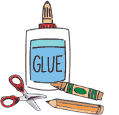
Art Center
Children express themselves through painting, drawing, modeling and other forms of art. Children are most creative when they work with materials such as water, sand, clay, paint, finger paint, crayons, paste, soap, play dough, wooden sticks, fabrics, and paper. When creating art projects they express their feelings and ideas.
Skills Developed in the Art Center:
- Enjoyment of the creative process
- Experience with several arts and crafts supplies
- Expression of feelings or ideas using a variety of art supplies
- Observance of movement, texture, color or line composition
- Development of visual perceptual skills
- Development of positive self-concept
- Observance of a story or mood represented in pictures
- Learning to respect different ideas and different ways of working
- Learning to handle and care for art tools appropriately
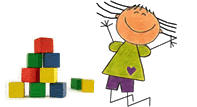
Block Center
The block area is a very important center. Children use different varieties of shapes and sizes of the blocks to create and recreate their experiences and images.
Skills Developed in the Block Center:
- Classification of various sizes and shapes
- Manipulation for muscle development
- Organizational skills
Language development
- Mathematical relationships
Gravity and leverage concepts
- Basic concepts of weight, shape, proportion and balance
Problem solving skills
- Creative dramatics
- Human relations skills - respect for ideas and rights of others
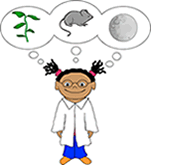
Science Center
Many activities for preschool children provide excellent opportunities to help children understand scientific principles and a scientific approach to learning. Gardening either outdoors or indoors, caring for pets, insects and other growing things in their environment afford opportunity for observation and experimentation. Young children are learning while they enjoy playing with such things as magnets, prisms, pulleys, magnifying glasses, and scales.
Skills Developed in the Science Center:
- Ability to observe accurately what is seen
- Ability to report accurately using correct terminology
- Ability to see relationships
- Ability to understand relationships between events (frees the child from fears and superstitions)
- Ability to develop a feeling of control over biological and physical environments
- Development of independence and self confidence
- Development of increased vocabulary skills through experiments
- Development of more sophisticated classification and organizational skills
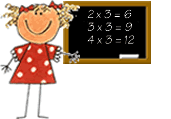
Math
Every young child is aware of and has used certain mathematical ideas before entering Pre-School. As concepts the child already understands are determined, various activities for concept development and reinforcement are part of the function of the math center. Such activities involve manipulation of objects with opportunities for the children to verbalize discoveries and understandings.
Skills Developed in the Math Center:
- Ability to count objects and people
- Ability to recognize, identify and compare sets
- Ability to identify positional relations
- Ability to make comparisons through measurement
- Ability to classify geometric shapes
- Ability to associate number concepts with labels
- Ability to use ordinal numbers correctly Money identification; counting
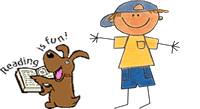
Language Arts Center
Language arts is an integral part of every activity that occurs in our pre-school program. However, we have a center devoted to language arts, helping to develop specific skills and concepts.
Skills Developed in the Language Arts Center:
- Development of an appreciation and respect for books.
- Developing the ability to look at pictures for their story.
- Development of an awareness of different ways of listening.
- Ability to match letters and words.
- Ability to sort and classify letters and words.
- Ability to see likenesses and differences in letters and words.
- Ability to follow directions.
- Development of visual perception skills.
- Ability to copy letters and words.
- Develop recognition of printed letters and words.

Home Living Center
The Home Living center has props that resemble a home environment, providing an opportunity to develop fantasies and a place to act them out. The most common “make-believe” revolves around the classic spot known as the "Home Living Center." It provides for almost limitless activities of a highly creative nature.
Skills Developed in the Home Living Center:
-
Ability to interpret facial expressions, gestures, posture, and tone of voice.
- Ability to convey ideas through pantomime.
- Ability to role play unfinished stories.
- Ability to express ideas verbally.
- Ability to act out varied emotions.
- Development of sensitivity to others.


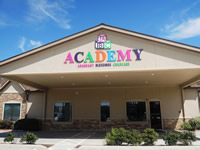



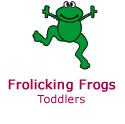

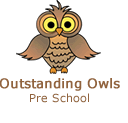
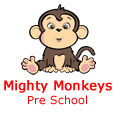
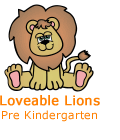
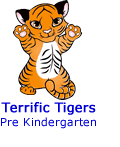
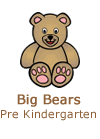









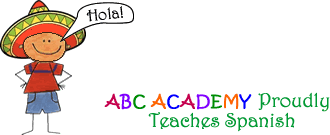
 Art Center
Art Center Block Center
Block Center Science Center
Science Center Math
Math  Language Arts Center
Language Arts Center Home Living Center
Home Living Center